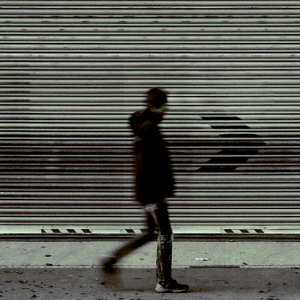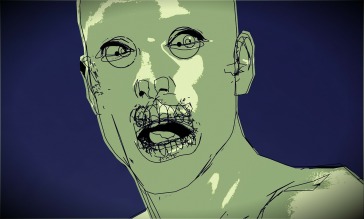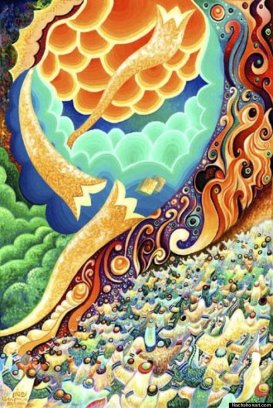
Rabbi Israel ben Eliezer, the Baal Shem Tov (Master of the Good Name), was a mystic and spiritual teacher who lived in the 18th century Eastern Europe and founded the Hasidic movement in Judaism. According to Hasidic teachings, a Jewish spiritual practice is a mitzvah, an opportunity for the soul to connect to the Divine. Rosh Hashanah is associated with the mitzvah of sounding the Shofar (traditionally a ram’s horn) to wake the soul from its spiritual slumber and during Elul (the month preceding Rosh Hashanah). It is customary to sound the Shofar every day during morning prayers to prepare for the Jewish New Year.
Elul is a time for Teshuva, which is usually translated as “atonement” but is more accurately translated according to the root of this word: “to return.” Teshuva is the process of returning to one’s true self. The Jewish spiritual practice of sounding the Shofar is not just an event happening on the outside, it is also an inner event happening within the soul. The psychological and spiritual disposition, the intention of the person engaging in the mitzvah deeply effects the experience of the mitzvah. The following is my interpretation of a story told by the Baal Shem Tov, to describe the inner state associated with sounding the Shofar:
There was once a great King whose vast realm spanned many lands. The King was good, wise and kind. He knew that the throne was given to him in order to serve his people and that his power came from a Higher source and he dedicated his life to stewarding and building a healthy kingdom. The King had a son, a prince whom he loved very much. The Prince lived in the royal castle with his family and his days were spent studying, practicing arts that would prepare him to govern and learning about people so he could serve them. The Prince was taught that, although he was a prince, he was not here just to live for himself, and that he was part of a great tapestry of life — that he was bound together by invisible threads to all the other people and beings that made up this tapestry and was here to be of service this great whole. He learned that human beings should be treated with the utmost respect, that life was sacred and how each of his actions was important. How easy it was to destroy and how hard it was to build. He was schooled to not let the reasons for his actions come from outside himself but from within, not to react but to choose and most importantly to love his fellow as himself. He learned these and many other things and the life of the Prince was very glad.
 Then one day his father, the King, told him he must go to a small town very far from the castle to a place so far away that most people did not even know that there was a King. He was told to live with and learn about the people there. It pained the heart of the Prince to leave his father, family and everything he loved, but he trusted his father and so he departed on his mission. He journeyed across the land to the edge of his father’s realm and entered into the town. Although he was wearing the royal garb of the castle, none of the people in the town recognized him for who he was. The Prince made his way to the town market and his eyes beheld new sights that worried him. The people of this town did not conduct themselves as those who inhabited the castle and its surrounding lands.
Then one day his father, the King, told him he must go to a small town very far from the castle to a place so far away that most people did not even know that there was a King. He was told to live with and learn about the people there. It pained the heart of the Prince to leave his father, family and everything he loved, but he trusted his father and so he departed on his mission. He journeyed across the land to the edge of his father’s realm and entered into the town. Although he was wearing the royal garb of the castle, none of the people in the town recognized him for who he was. The Prince made his way to the town market and his eyes beheld new sights that worried him. The people of this town did not conduct themselves as those who inhabited the castle and its surrounding lands.
The people of this place were pushing and shoving each other. Yelling at each other, rather than speaking to each other. He saw people lying in the street and others walking by them or over them as if they weren’t there. He saw many people looking down and ignoring each other. Without saying it they seemed to say that to be alive was a burden, that other people were burdens, simply mouths to feed. He began to walk through the market scanning the faces of the crowd, and he saw that people in this town had forgotten that they were good, that life was a gift, that there was a King and that their actions mattered.
The Prince yearned to return to the castle but was bound to his father’s will to find work and lodgings and to live among them and so he did. At first life in this town was painful, the smells of sweat, animals and other odors offended him and made it hard for him to breathe. It was also hard to be in the company of others and to see how they spoke to each other. They even spoke to him in the same manner. Although he tried to reply courteously, eventually he felt within himself anger. It seemed as if people found something to be upset about even when there was nothing wrong and it grew harder to not react to the daily teasing, taunting and yelling that many people accepted as a part of life. Still, he tried to set an example, by being kind to those around him and speaking about the importance of loving one’s neighbor. He knew that there was a higher way of living, but most people did not listen or care and were more interested in going to the games and circuses that happened every night.
Slowly, the bad feeling in him grew and he constantly had a feeling of wanting to get away or lash out even though there was nowhere to go. The Prince started to doubt himself, to believe he was too small to withstand the darkness of the ignorance and suffering he saw all around him.
He tried to hold on to the lessons he learned in the castle, but he began to think that he was only being punished for his good deeds and that his kindness was for naught. The Prince’s heart grew closed and eventually, he began to despair. He became cynical. It grew harder for him to care about anything, and he began to dislike people for no reason. The cruel behavior people had toward each other, and the self-destructive actions that once repulsed him, he now took for granted and even laughed at.
 Over time the Prince grew so used to being spoken at and yelled at, being treated as if he were some sort of object rather than a person, that eventually, he forgot his thoughts and dreams, for in this town so far from the castle, the soul did not matter. He became coarse, numb to himself, and everything around him became a joke. It had been so long since he had been at the castle, so long since he had been in the presence of the King, that he forgot how to speak the language of the castle, forgot the wisdom he learned. His robes grew encrusted with dirt and stains, tears and patches, and now resembled the mud-colored coarse rags everyone else around him wore. Many years past and his life as a prince receded so far in his memory that it was but a dim dream. His mind was focused mainly on day-to-day survival and distraction with no thoughts toward anything beyond.
Over time the Prince grew so used to being spoken at and yelled at, being treated as if he were some sort of object rather than a person, that eventually, he forgot his thoughts and dreams, for in this town so far from the castle, the soul did not matter. He became coarse, numb to himself, and everything around him became a joke. It had been so long since he had been at the castle, so long since he had been in the presence of the King, that he forgot how to speak the language of the castle, forgot the wisdom he learned. His robes grew encrusted with dirt and stains, tears and patches, and now resembled the mud-colored coarse rags everyone else around him wore. Many years past and his life as a prince receded so far in his memory that it was but a dim dream. His mind was focused mainly on day-to-day survival and distraction with no thoughts toward anything beyond.
Things stayed this way for a very long time until one morning the Prince saw a crowd gathering along the sides of the main street of the town. He asked a passerby what was happening he was told that the “King” was passing through the town and it was a special day. At first, the Prince, thought perhaps the “King” was another type of circus performer, and so he pushed close to the front of the crowd to get a better view. He saw something in the street he did not expect: uniformed soldiers with the royal crest emblazoned on their coats. Then the eyes of the Prince went wide, and it was as if a horn blasted inside him, and his heart began to beat in his chest. The Prince, along with the rest of the crowd, stared at the proud soldiers marching in orderly lines and then following behind them came row upon row of royal Knights seated on great horses. Their silver armor gleamed in the sunlight and their bearing was regal and beautiful. Then into view came a golden carriage and in it sat a man whose being emanated love, kindness, justice, and mercy — in it sat the King. It seemed as if an invisible light was radiating from the carriage, strengthening and healing all whom it touched and many of the eyes in the crowd began to tear though they knew not why. All who saw him knew that this was the King. Something was happening to him, to everyone.
 In the mind of the Prince a glimmer of remembrance awoke within him and he recalled that he was the son of the King and that something terrible had happened to him. That the King was real. Love was real. Goodness was real. Truth was real. That the reality of who he was, was so much more than the person he appeared to be, the coarse person he had been acting like. That he was the Prince! He was the son of the King! The Prince began to weep for how much he had lost, how much he had forgotten, and he knew that he so badly needed to speak to the King, to let the King see who he was and there in front of him was the carriage of the King.
In the mind of the Prince a glimmer of remembrance awoke within him and he recalled that he was the son of the King and that something terrible had happened to him. That the King was real. Love was real. Goodness was real. Truth was real. That the reality of who he was, was so much more than the person he appeared to be, the coarse person he had been acting like. That he was the Prince! He was the son of the King! The Prince began to weep for how much he had lost, how much he had forgotten, and he knew that he so badly needed to speak to the King, to let the King see who he was and there in front of him was the carriage of the King.
The Prince knew that at any moment he could lose this spark of truth and that he must do something. But the Prince could not speak for he did not have the words, the high speech of the castle long forgotten. Thus he could not call out to the King, could not call out, “Father it’s me!” Nor could he approach the carriage slowly making its way past him, for he knew that guards would not recognize him for he no longer resembled who he once was, his face now hard, covered in dirt and lines of pain, and his clothing was the coarse, dirty, torn garments of the street folk.
All the Prince wanted was to be next to his father the King, but the carriage was getting further and further away. It felt as if his heart were going to burst in his chest and suddenly out of his mouth, from the depths of his soul, came an involuntary cry, a loud piercing wail that shocked everyone in the crowd who heard it. Every inch of his being was screaming screaming wailing, wanting so badly to return to the presence of his father of the King, to return to his true self, his original being. The crowd took a few steps back but ignored the screaming man pretending he was not there. The guards around the carriage tightened their grips on their spears, watching the man, alert for any danger.
Then the carriage of the King slowed to a halt, and at some unseen signal, a guard approached the King. The guard turned his ear to the King and then looked at the man weeping in the crowd and his eyes lit up with a sudden knowing, and he turned and looked closer at the pitiful man still crying still wailing. The Prince looked toward the King with bright eyes on fire, with yearning and tears, and to the surprise of all gathered there, the guard walked from the carriage to the crying man dressed in rags, stood in front of him, saluted him and then gently grasped his arm and led him to the carriage. When the King heard the sound of the cry, he knew it was his son the Prince; the King remembered this cry from when the Prince was a baby, and that was a cry he would never forget. The Prince wept and felt the strong arms of his father, the King, embrace him and pull him into the carriage. The Prince and the King were reunited and there was great rejoicing in all of the land.
The Baal Shem Tov taught that the sound of the Shofar is the sound of the Prince crying out to his father the King. It is the sound of our yearning to return to the Source of our true selves. The mitzvah of the Shofar is not about blowing a horn; it is a ritual for self-realization. Rosh Hashanah is known as a day of crowning Hashem as King, a Day of Remembrance and a Day of Shofar sounding.
May Hashem bless us that this Rosh Hashanah when we hear the Shofar, we remember who we are, we return to our true Source, that we reclaim our identity as children of the Divine and be written into the Book of Life.
